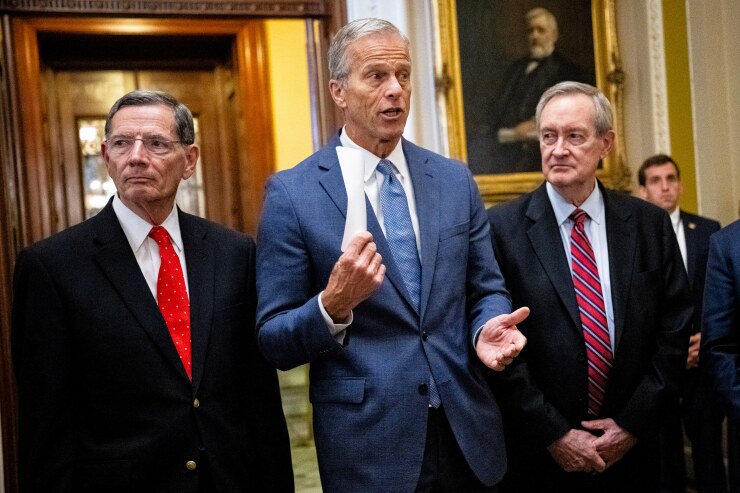
WASHINGTON — Republicans' sprawling budget bill passed the Senate following a long series of votes on amendments that spanned into late Monday evening and Tuesday morning.
The bill passed 50-51 mostly along party lines, although there were some important Republican holdouts, necessitating Vice President JD Vance to cast the tie-breaking vote. Republican Sens. Thom Tillis of North Carolina — the financial institutions subcommittee chair on the Senate Banking Committee — Susan Collins of Maine and Rand Paul of Kentucky, voted against the bill.
The measure now goes to the House, where leaders are trying to push the bill through before President Donald Trump's July 4 deadline. They face a
While bank regulation is usually exempt from the political jockeying that comes with budget bills,
Here's the top items in the budget bill that bankers should know about as the legislation approaches final passage.
CFPB funding
The final Senate budget bill
"For the first time since the passage of Dodd-Frank, Congress is reining in the unaccountable Consumer Financial Protection Bureau and decreasing its mandatory funding cap by 46%, which will save over $2 billion and require the Bureau to be fiscally responsible," said Sen. Tim Scott, R-S.C., the chairman of the Senate Banking Committee, in a statement after the bill's passage.
Scott and the Senate Banking Committee initially proposed eliminating that path of funding the bureau entirely, bringing down the cap to zero. The Senate parliamentarian nixed that provision, but allowed simply lowering the cap. This gives Republican and Democratic lawmakers alike a new mechanism to raise or lower the CFPB's funding in the future.
An amendment from Sen. Elizabeth Warren, D-Mass., the ranking member of the Senate Banking Committee and a key architect of the CFPB, to preserve the bureau's funding failed late Monday evening in a party line vote.
"From the beginning, Republicans in Congress have been trying to kill it, and now they want to slash the CFPB's modest funding cap almost in half," Warren said on the Senate floor.
No 1071 delay
The CFPB might have had a de facto funding cut, but one of bankers other big priorities at the bureau — delaying the CFPB's 1071 small business data collection rule — didn't pass muster.
Although the parliamentarian approved the Senate Banking Committee's initial plan to delay the implementation of 1071 for 10 years, the measure wouldn't have saved enough money compared to the 46% slash to the bureau's funding, and it fell out of the Senate Banking Committee's contribution to the megabill bill in the later stages.
Remittances
Remittances — noncommercial transfers on the money people in the United States send abroad — are expected to be a battleground area as the megabill moves to the House, and it could have implications for banks depending on how the pieces fall.
The Senate version of the bill imposes a new excise tax on remittance transfers, although there's exceptions for U.S. financial institutions. It's part of a campaign to increase taxes on undocumented immigrants that Republicans want to use to finance their tax cuts, but different versions of the legislation could also negatively hit payment providers of all stripes, including banks.
"If you're funding a remittance with a bank deposit, so if it's coming out of a bank deposit, or a credit card or a debit card, the tax will not apply," said Paul Merski, senior vice president of congressional relations at the Independent Community Bankers of America. "If you go to a bank and fund your payment to another country, the tax will not apply. We're going to have to see the final Treasury and IRS regulations and implementation of the tax, but the legislation was changed to provide maximum protection for traditional banks."
The House version of the tax is higher — 3.5% on remittances instead of 1% in the Senate bill — and doesn't include the final language in the Senate bill right now for traditional banks, although that could very well change.
There's a chance, though, that House budget hawks won't allow this break in particular to pass.
S Corps
But in many ways, taxes are where bankers really scored in the megabill. One of the biggest items on banks' wishlist was extending the temporary Section 199(a) provisions established in the 2017 tax law, which allows owners of pass-through entities to deduct up to 20% of their taxable income from those entities.
That measure appears in both the House and the Senate bills, which means it's almost sure to pass into the final law.
A lot of community banks are so-called subchapter S banks, which have fewer than 75 shareholders. Bank groups have argued that the provision helps keep community bank taxes in line with the corporate tax rate.
ACRE Act
Both the House and the Senate have a version of the ACRE Act as well, which bankers have advocated for. Sen. Jerry Moran, R-Kan., is the primary Senate sponsor while Rep. Nathaniel Moran, R-Texas, is the primary House sponsor.
The bill will give a 20% tax break for lending in rural areas, essentially if the collateral is farm land or farm real estate.
Bankers have argued that ACRE would help them compete with the Farm Credit System, a government-sponsored enterprise that can access capital markets at a much lower cost.






